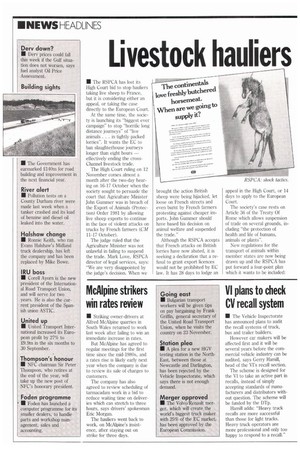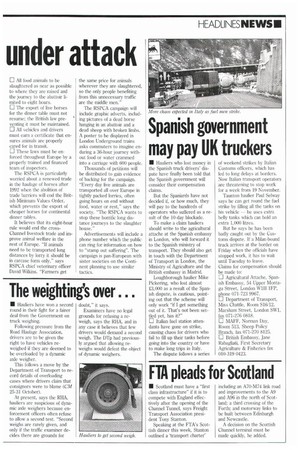Livestock h auhers under attack
Page 6

Page 7

If you've noticed an error in this article please click here to report it so we can fix it.
• The RSPCA has lost its High Court bid to stop hauliers taking live sheep to France, but it is considering either an appeal, or taking the case directly to the European Court. At the same time, the society is launching its "biggest ever campaign" to stop "horrific long distance journeys" of "live animals . . in tightly packed lorries". It wants the EC to ban slaughterhouse journeys longer than eight hours — effectively ending the crossChannel livestock trade.
The High Court ruling on 12 November comes almost a month after the two-day hearing on 16-17 October when the society sought to persuade the court that Agriculture Minister John Gununer was in breach of the Export of Animals (Protection) Order 1981 by allowing live sheep exports to continue in the face of violent attacks on trucks by French farmers (CM 11-17 October).
The judge ruled that the Agriculture Minister was not unlawful in failing to suspend the trade. Mark Love, RSPCA director of legal services, says: "We are very disappointed by the judge's decision. When we
brought the action British sheep were being hijacked, let loose on French streets and even burnt by French farmers protesting against cheaper imports. John Gummer should have based his decision on animal welfare and suspended the trade."
Although the RSPCA accepts that French attacks on British lorries have now abated, it is seeking a declaration that a refusal to grant export licences would not be prohibited by EC law. It has 28 days to lodge an appeal in the High Court, or 14 days to apply to the European Court.
The society's case rests on Article 36 of the Treaty Of Rome which allows suspension of trade on several grounds, including "the protection of health and life of humans, animals or plants". New regulations for the transport of animals within member states are now being drawn up and the RSPCA has put forward a four-point plan which it wants to be included: All food animals to be slaughtered as near as possible to where they are raised and the journey to the abattoir limited to eight hours.
The export of live horses for the dinner table must not resume; the British law preventing it must be maintained.
▪ All vehicles and drivers must earn a certificate that ensures animals are properly cared for in transit.
El These laws must be enforced throughout Europe by a properly trained and financed team of inspectors.
The RSPCA is particularly worried about a renewed trade in the haulage of horses after 1992 when the abolition of trade barriers will end the British Minimum Values Order, which prevents the export of cheaper horses for continental dinner tables.
It believes that its eight-hour rule would end the crossChannel livestock trade and improve animal welfare in the rest of Europe. "If animals need to be transported long distances by lorry it should be in carcase form only," says RSPCA chief veterinary officer David Wilkins. "Farmers get the same price for animals wherever they are slaughtered, so the only people benefiting from this unnecessary traffic are the middle men."
The RSPCA campaign will include graphic adverts, including pictures of a dead horse hanging in an abattoir and a dead sheep with broken limbs. A poster to be displayed in London Underground trains asks commuters to imagine enduring a 36-hour journey without food or water crammed into a carriage with 600 people.
Thousands of petitions will be distributed to gain evidence of backing for the campaign. "Every day live animals are transported all over Europe in tightly packed lorries, often going hours on end without food, water or rest," says the society. The RSPCA wants to stop these horrific long distance journeys to the slaughter house."
Advertisements will include a phone number which the public can ring for information on how to "stamp out suffering". The campaign is pan-European with sister societies on the Continent planning to use similar tactics.












































































































